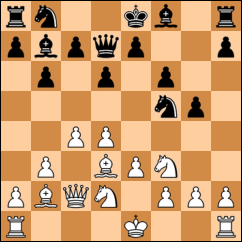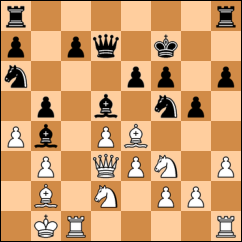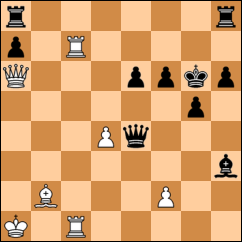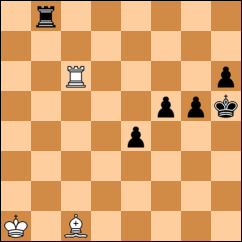K.Ammann–S.Black
Route 20 Chess Club
Freeport, Illinois, Nov. 24, 2009
1.d4 f6?!
Steve is not one for playing conventional openings.
2.Nf3 g5 3.b3
Should I have just played 3.e4? Probably.
3...Nh6
What's he doing?
4.Bb2 b6 5.Nb2 Bb7 6.c4 Nf5 7.e3 d6?
This move doesn't free any piece for development, unlike, say, 7...e6!?.
8.Bd3 Qd7 9.Qc2
I was feeling contented with my development so far.
9...e6?
Steve needs to retreat that knight.
10.0-0-0
Not bad, but a miscue in this case. 10.d5 threatens 11.dxe6, undermining the protection of the knight while gaining a tempo on the queen, which therefore has to retreat to g7 or e7.
10...d5??
Taking the square away from me -- a sensible thought, but it doesn't work out well.
11.cxd5 Bxd5 12.Be4
I missed the subtler, far superior 12.e4!. My move puts Steve back in the game.
12...h6
Steve is squandering his opportunity. He needs to catch up on his development. 12...Nc6, for example, would have been sensible.
13.Kb1 Bb4 14.Rc1 Na6 15.Qd3
Now that Steve's knight is off b8, the pin on the d5-bishop is nowhere near as compelling as it was before. I should have pulled my own bishop back to d3. But I wanted to get my queen out from in front of my rook, and I also saw that Steve's a6-knight was hanging.
15...b5 16.h3 Kf7 17.a4
For quite a bit of this game, Steve had the opportunity to drive my knight off its best square with ...g4. Now I have a parallel opportunity on the same file, but I miss it too.
17...Bxd2
Steve begins to lose patience.
18.Nxd2 bxa4?? 19.Qxa6 axb3
Time for one of my trademark blunders! This should perhaps be a new variety of chess problem: "Find the stupid move that gives your opponent a stellar opportunity."
20.Nxb3??
Steve, a sharp tactical player, wasted no time capitalizing on my error.
20...Bxe4+ 21.Ka1 Bxg2
How could I have prevented this? 20.Bxd5 would have done the trick. Also, 20.Bd3 Bxh2 is much less threatening than it looks.
22.Nc5
I'm trying to change the dynamic with an initiative move, but it accomplishes little: now I have a menacing knight outpost, but I've also blocked the c-file.
22...Qd5??
Misses the threat of 23.Rhe1 and 24.e4. Fortunately for Steve, I missed it too.
23.Rhg1 Bxh3??
With my knight on c5, 24.e4 is now possible without the preparatory rook move. But, again, I wasn't thinking about that.
24.Rc2??
My chances of seizing back the game are now pretty much gone.
24...Nd6 25.e4? (a bit late for that) Nxe4 26.Nxe4 Qxe4 27.Rxc7+ Kg6 28.Rgc1?!
Steve has no particular reason to feel nervous about the doubled rooks.
28...Qg2 29.R1c6 (instead of 29.Qd6, maneuvering into black's backfield) Qxf2 30.d5 Rab8 31.Rc2 Qe1+ 32.Bc1
Instead of 32.Rc1, which I found myself painfully regretting a few moves down the line. I think I was afraid that Steve would sac the exchange on b2 to yank my king out into the great wide open. But in retrospect, if he had done that, I could have ignored his b2-rook, taken his queen and had a winning advantage! Note to self: Don't be afraid of rabbits when there's a wolf in the yard.
32...exd5 33.R2c5 Bf1
33...Bf5!, threatening 34...Rb1+, would have been decisive.
34.Qa2 Bc4
Better is 34...Bd3, with the same threat as above.
35.Qc2+ Kh5 36.Qh2+ Kg6 37.Qc2+
Sure, I'll take a draw at this point! But Steve doesn't go for it.
37...Qe4 38.Qxe4+ dxe4 39.Rxc4 f5 40.R4c6+ Kh5 41.Rxa7 Rhc8 42.Raa6 Rxc6 43.Rxc6
At this point I'm thinking, "Bishop against four pawns? This might be doable." But those pawns are also connected, and Steve's king is right next to them, while mine is off in the antipodes.
43...f4 44.Rc2
44.Re6 e3 45.Re5 would have limited black's possibilities somewhat.
44...e3 45.Rh2+ Kg4 46.Rxh6 e2 47.Bd2 Rd8 48.Ba5 Rd1+
Obviously overlooking the pin 48...Ra8. But a devastating flourish is to postpone the pinning move in order to execute the simple advance 48...f3.
49.Kb2 e1Q 50.Bxe1 Rxe1 51.Rh8 f3 52.Rf8 Kg3 53.Rf5 g4 54.Kc2 f2 55.Rxf2 Kxf2 56.Kd2 Re3 0-1
It's mate in 6. Goodnight, Gracie.








0 comments:
Post a Comment